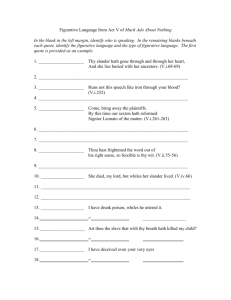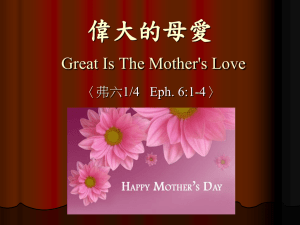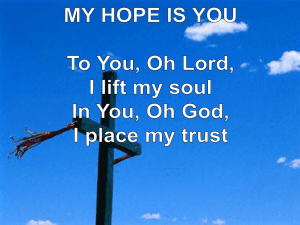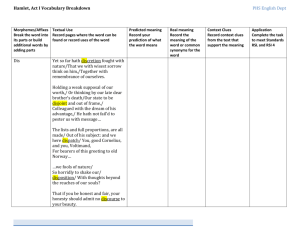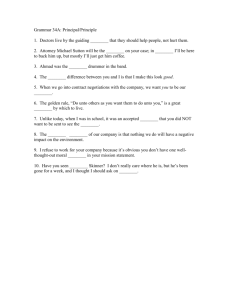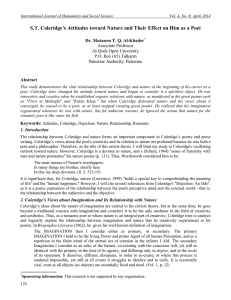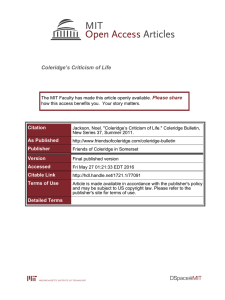from Religious Musings
advertisement
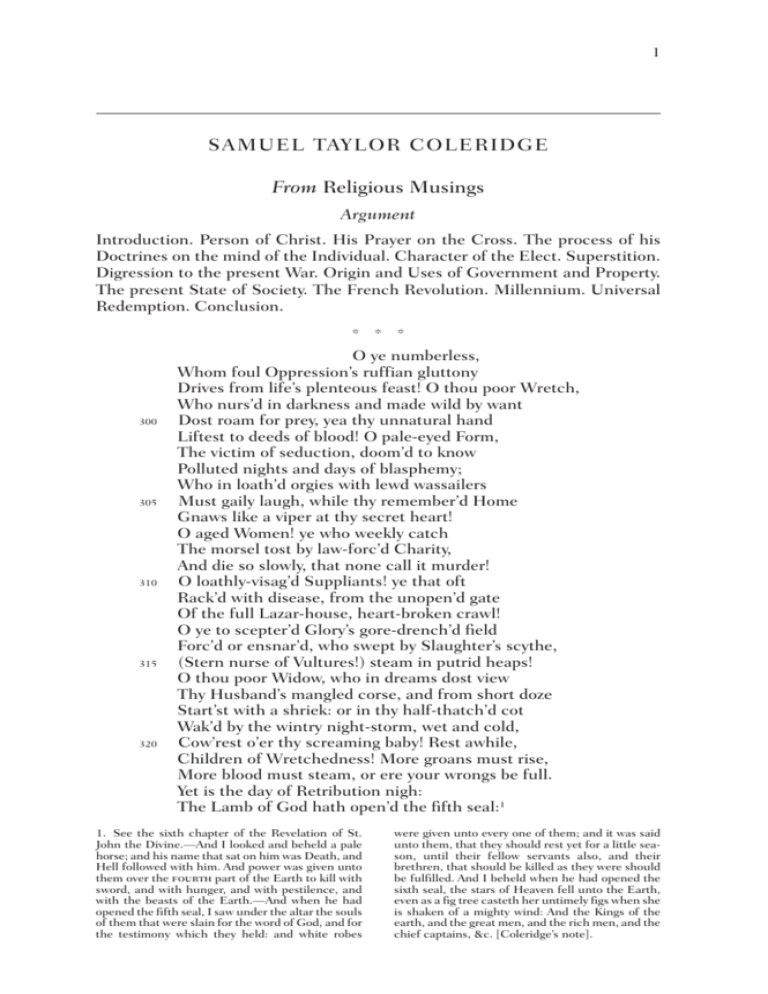
1 SAMUEL TAYLOR COLERIDGE From Religious Musings Argument Introduction. Person of Christ. His Prayer on the Cross. The process of his Doctrines on the mind of the Individual. Character of the Elect. Superstition. Digression to the present War. Origin and Uses of Government and Property. The present State of Society. The French Revolution. Millennium. Universal Redemption. Conclusion. 300 305 310 315 320 * * * O ye numberless, Whom foul Oppression’s ruffian gluttony Drives from life’s plenteous feast! O thou poor Wretch, Who nurs’d in darkness and made wild by want Dost roam for prey, yea thy unnatural hand Liftest to deeds of blood! O pale-eyed Form, The victim of seduction, doom’d to know Polluted nights and days of blasphemy; Who in loath’d orgies with lewd wassailers Must gaily laugh, while thy remember’d Home Gnaws like a viper at thy secret heart! O aged Women! ye who weekly catch The morsel tost by law-forc’d Charity, And die so slowly, that none call it murder! O loathly-visag’d Suppliants! ye that oft Rack’d with disease, from the unopen’d gate Of the full Lazar-house, heart-broken crawl! O ye to scepter’d Glory’s gore-drench’d field Forc’d or ensnar’d, who swept by Slaughter’s scythe, (Stern nurse of Vultures!) steam in putrid heaps! O thou poor Widow, who in dreams dost view Thy Husband’s mangled corse, and from short doze Start’st with a shriek: or in thy half-thatch’d cot Wak’d by the wintry night-storm, wet and cold, Cow’rest o’er thy screaming baby! Rest awhile, Children of Wretchedness! More groans must rise, More blood must steam, or ere your wrongs be full. Yet is the day of Retribution nigh: The Lamb of God hath open’d the fifth seal:1 1. See the sixth chapter of the Revelation of St. John the Divine.—And I looked and beheld a pale horse; and his name that sat on him was Death, and Hell followed with him. And power was given unto them over the fourth part of the Earth to kill with sword, and with hunger, and with pestilence, and with the beasts of the Earth.—And when he had opened the fifth seal, I saw under the altar the souls of them that were slain for the word of God, and for the testimony which they held: and white robes were given unto every one of them; and it was said unto them, that they should rest yet for a little season, until their fellow servants also, and their brethren, that should be killed as they were should be fulfilled. And I beheld when he had opened the sixth seal, the stars of Heaven fell unto the Earth, even as a fig tree casteth her untimely figs when she is shaken of a mighty wind: And the Kings of the earth, and the great men, and the rich men, and the chief captains, &c. [Coleridge’s note]. 2 / Samuel Taylor Coleridge 325 330 335 340 345 350 355 360 365 370 And upward rush on swiftest wing of fire Th’ innumerable multitude of Wrongs By man on man inflicted! Rest awhile, Children of Wretchedness! The hour is nigh: And lo! the Great, the Rich, the Mighty Men, The Kings and the Chief Captains of the World, With all that fix’d on high like stars of Heaven Shot baleful influence, shall be cast to earth, Vile and down-trodden, as the untimely fruit Shook from the fig-tree by a sudden storm. Ev’n now the storm begins:2 each gentle name, Faith and meek Piety, with fearful joy Tremble far-off—for lo! the Giant Frenzy Uprooting empires with his whirlwind arm Mocketh high Heaven; burst hideous from the cell Where the old Hag, unconquerable, huge, Creation’s eyeless drudge, black Ruin, sits Nursing th’ impatient earthquake. O return! Pure Faith! meek Piety! The abhorred Form3 Whose scarlet robe was stiff with earthly pomp, Who drank iniquity in cups of gold, Whose names were many and all blasphemous, Hath met the horrible judgment! Whence that cry? The mighty army of foul Spirits shriek’d Disherited of earth! For She hath fallen On whose black front was written Mystery; She that reel’d heavily, whose wine was blood; She that work’d whoredom with the Daemon Power And from the dark embrace all evils things Brought forth and nurtur’d: mitred Atheism! And patient Folly who on bended knee Gives back the steel that stabb’d him; and pale Fear Hunted by ghastlier terrors than surround Moon-blasted Madness when he yells at midnight! Return pure Faith! return meek Piety! The kingdoms of the world are yours: each heart Self-govern’d, the vast family of Love Rais’d from the common earth by common toil Enjoy the equal produce. Such delights As float to earth, permitted visitants! When on some solemn jubilee of Saints The sapphire-blazing gates of Paradise Are thrown wide open, and thence voyage forth Detachments wild of seraph-warbled airs, And odors snatch’d from beds of amaranth, And they, that from the crystal river of life 2 The French Revolution [Coleridge’s note]. 3. And there came one of the seven Angels which had the seven vials and talked with me, saying unto me, come hither! I will shew unto thee the judgment of the great Whore, that sitteth upon many waters: with whom the Kings of the earth have committed fornication, &c. Revelation of St. John the Divine, chapter the seventeenth [Coleridge’s note]. Religious Musings / 3 375 380 385 390 395 400 405 Spring up on freshen’d wing, ambrosial gales! The favor’d good man in his lonely walk Perceives them, and his silent spirit drinks Strange bliss which he shall recognize in heaven. And such delights, such strange beatitude Seize on my young anticipating heart When that blest future rushes on my view! For in his own and in his Father’s might The Savior comes! While as to solemn strains The thousand years4 lead up their mystic dance, Old Ocean claps his hands! The Desert shouts! And soft gales wafted from the haunts of Spring Melt the primaeval North! The mighty Dead Rise to new life, whoe’er from earliest time With conscious zeal had urg’d Love’s wond’rous plan, Coadjutors of God. To Milton’s trump The odorous groves of earth reparadis’d Unbosom their glad echoes: inly hush’d Adoring Newton his serener eye Raises to heaven: and he of mortal kind Wisest, he5 first who mark’d the ideal tribes Down the fine fibers from the sentient brain Roll subtly-surging. Pressing on his steps Lo! Priestley6 there, Patriot, and Saint, and Sage, Whom that my fleshly eye hath never seen A childish pang of impotent regret Hath thrill’d my heart. Him from his native land Statesmen blood-stain’d and Priests idolatrous By dark lies mad’ning the blind multitude Drove with vain hate: calm, pitying he retir’d, And mus’d expectant on these promis’d years. O Years! the blest preeminence of Saints! Sweeping before the rapt prophetic Gaze Bright as what glories of the jasper throne Stream from the gorgeous and face-veiling plumes Of Spirits adoring! Ye, blest Years! must end, And all beyond is darkness! * * * 1794 4. The Millennium:—in which I suppose, that Man will continue to enjoy the highest glory, of which his human nature is capable.—That all who in past ages have endeavored to ameliorate the state of man, will rise and enjoy the fruits and flowers, the imperceptible seeds of which they had sown in their former Life: and that the wicked will during the same period, be suffering the remedies adapted to their several bad habits. I suppose that this period will be followed by the passing away of this Earth, and by our entering the state of pure intellect; when all Creation shall rest from its labors [Coleridge’s note, added in the 1797 edition]. 5. David Hartley [Coleridge’s note]. 6. Sir Isaac Newton (line 390), Hartley (line 392), and Joseph Priestley were believers in apocalyptic prophecies, and all three had written interpretive commentaries on the Book of Revelation.


